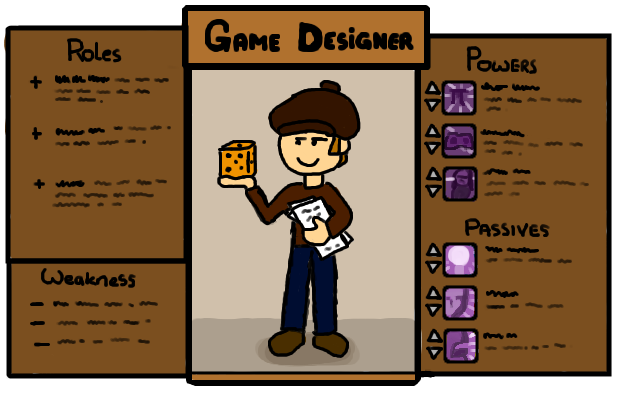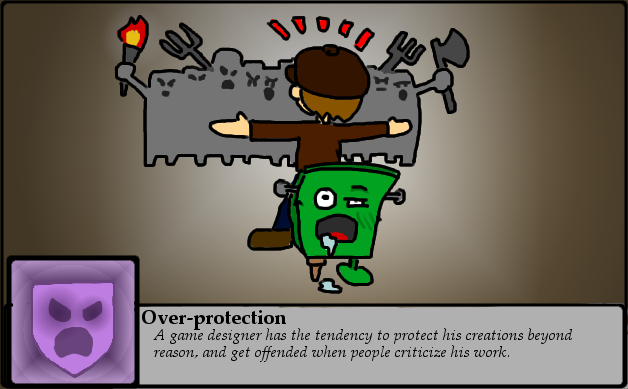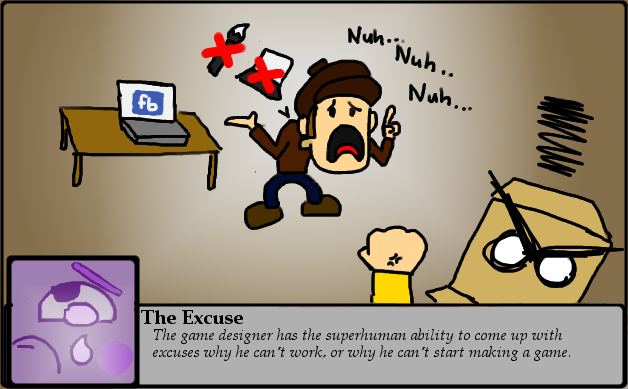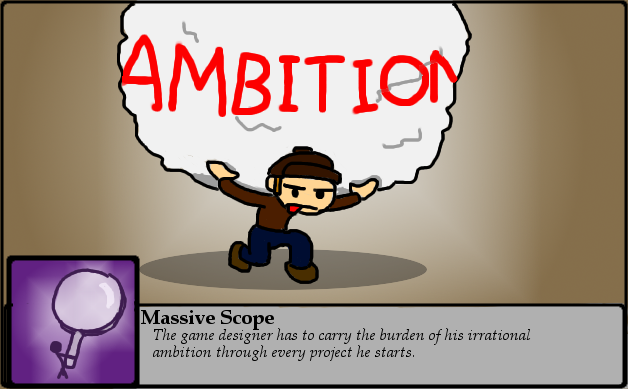Trending
Opinion: How will Project 2025 impact game developers?
The Heritage Foundation's manifesto for the possible next administration could do great harm to many, including large portions of the game development community.

Featured Blog | This community-written post highlights the best of what the game industry has to offer. Read more like it on the Game Developer Blogs or learn how to Submit Your Own Blog Post
So you've got everything it needs to be a game designer? Congratulations! Be sure not to step in one of these pitfalls though...

This blogpost is written with great care and attention at Abbey Games.

A few weeks ago, I started with a series of blogposts about what it’s like and what it takes to be a game designer. Because we’re talking games here, I’m approaching these posts as an RPG character creation guide. The series consists of the following chapters:
Weaknesses: What are the biggest pitfalls?(This chapter!)
In this final chapter, we’ll look into the things that are most likely to keep you from being an awesome game designer. In every career path there are risks that can stop you from achieving your goals. Most of those have a lot to do with lack of knowledge about what it’s going to be like to have the profession you’re aiming for. A good example is a professional sportsman, like a (soccer) football player. When he was 16 or so, he might have dreamed:”I’m going to be a good player, because I have a great technique, I’m fast and I have a great endurance.” But he can easily forget that the world of a sportsman is more elaborate than it looks. Does he know that he might play badly because the target of his wonderful passes is always poorly chosen? Can he handle the pressure of thousands watching him, counting on him to succeed? Even more close to home, would the thought that he won’t be able to go out with his friends on Friday anymore, cross his mind? Game designers have their own pitfalls too. So here is the list of my three most dreaded pitfalls that you could cross in your potential game design career!

You know that feeling when you have achieved something? You’re proud of your work and proud of the effort you put in creating it. Well, game design is like that, only every time you think you achieved something, someone is waiting around the corner to destroy it. You think you got a great idea for a game, and the team says it sucks. You just pitched a nice mechanic, but no one likes it. You just proudly presented your prototype to the playtester, but they can’t even bare to play it more than 2 minutes. Everyone is waiting to take a shot at you. This can come up when you made a little game yourself, or it can occur when you’re still making a game with a team and just tested or pitched a mechanic.
Sometimes, in particular when you’re just starting to practice your game design skills, you’ll make games that nobody seems to like. Sure, you may be proud of you accomplishments, and your parents and friends say it’s fun, but they seem to be the only ones. Well, here is a rule of thumb. You’ll create 10 sucky games before you make a good one. It depends on your talent, but getting the hang of game design just takes time and practice. Don’t be discouraged if you don’t succeed straight away. Just look at it and ask yourself:”Why does it suck? What can I do better next time?” Then just drop it. It’s hard to leave a creation you worked hard on, but you need to take steps forward.
You can also have team members or playtesters that only seem able to criticize your ideas or mechanics while you’re still working on the game. However, they’re only doing this because they think the game could be better! Everyone can give valuable input, so listen closely. Don’t take it personal or get all defensive or downhearted. Listen closely to criticism, and try to look at the mechanics like they were not yours. Naturally, that’s how your players will see it! Most important, be reasonable about the quality of your idea. Ideas almost never work out as you think they would, so sometimes you have to accept that the idea doesn’t work out and sucks. Throw it away and try to fix the problem with other mechanics. Design to throw away is a common saying in game design. Be ready to do so.
If you’re an aspiring game designer, the “Creativity Killing” pitfall can also come from an unsuspected corner. You may have friends or family that you passionately show your game to. You know when someones new haircut or outfit looks horrible, but because you don’t want to hurt them, you say it looks great? Your friends will most likely do the same thing regarding your game. When you show your game, and you want to improve your game making abilities, be sure to mention to them that they should be honest. Tell them that they should to stop when they feel like they want to stop, for example.
The bottom line is: Be prepared to make things that just don’t work. Learn from them and throw them away.

So you got this GREAT idea for a game that includes the exciting themes of Laserknights and Midgetgolfing. Of course you’re thrilled to make this game, but alas, you can’t program or make art. So you have no choice, you just can’t make the game. What a bummer, life can be so unfair sometimes! You’d better go back to your mother’s basement to over-think your career choice, because this game design career is way to hard for you.
Aspiring game designers who keep making this excuse will never become a game designer. They’re missing most of the vital ingredients that make for one tasty game designer. The worst part is that these people completely lack the creativity and determination to solve this problem. What’s stopping you from learning how to program in easy to learn tools like Unity or Gamemaker? Why not use placeholders or free internet images until you find an artist? Why aren’t you actively searching for like minded people, while developing your communication skills? If that’s not possible, why aren’t you trying to translate the idea to a board game or paper prototype, just to test or show people what you can do? Making games is hard work, and if you can’t even be bothered to start making one, the industry has no room for you.
The excuse is also there when you already are making game with a team. You’re waiting for art, or for the programmer to finally finish the implementation of your idea. Probably, all you’re doing is generating hate from your team members for annoying them and being a lazy, probably facebooking, bum. There are thousands of things a game designer can do in the meantime. Prototype a new mechanic for example. Balance something that was off. Document important stuff. Organize a playtest. Study the game world by reading from a good book or Gamasutra. ![]() In the “worst” case, you can practice your programming and design skills by making little games. Keep yourself busy, the world of games is as vast as the human imagination!
In the “worst” case, you can practice your programming and design skills by making little games. Keep yourself busy, the world of games is as vast as the human imagination!

This is a bit of a painful one to talk about, because I keep walking into this pitfall. Ambition is a double edged sword. I think a certain “Molyneux” can back me up on that one. Game dev teams, especially when they’re relatively inexperienced, often think they can make this awesome game that is awesome in every corner of its awesome world. However, time is precious, people get distracted or demotivated and the game starts to break before the prototype is finished. The most important way to evade this pitfall is knowing yourself and knowing your team. Be rational and critical. Is your team really up to the challenge? Which project you previously did looks the most like this one? Isn’t the difference too big? A good workflow will most likely help you be realistic. If you can’t complete your SCRUM sprints for example, you’re probably less of a superhero than you think you are. Sadly, this will almost always be a process of trial and error. So toughen up and learn from it as quickly as possible!
However! I really ain’t saying:”Uww, making games is hard, uww, don’t be ambitious!” The contrast between belief and rationalism is strong in game making. If you really believe you can do it, and you really think your goals are worth the potential failure, you should totally go for it. Worst case scenario, you’ll get slapped by reality, learn about yourself and lose a lot of time (and maybe some money). Best case, you create something magnificent. Composer Leonard Bernstein once said:”To achieve great things, two things are needed; a plan, and not quite enough time.” I strongly believe in that, and if you have the strength and determination to work under great stress and responsibility, you shouldn’t waste your life and soul with playing it safe. Making games that express your heart is risky business to begin with. Nothing helps you more in discovering your capabilities than the 10 000 hours-rule mentioned in the third part of this blogpost series. Try to find the balance between ambition and safety, only then you’ll find the spiritual enlightenment of making YOUR game and the mortal delight of a profitable project.
Well, that was it! Hopefully, I made the world of the game designer a bit more approachable and clear for you. For the last time, I’d like to thank Jesse Schell, the guys and girls from Extra Credits and Joost van Dongen for taking the time to educate me through their videos, books and blogs. Now I’ll continue my struggle with my own ambitions over at Abbey Games, and I’ll try to blog about those struggles there every now and then. Thanks for reading! I learned a lot by writing this series, and I really hoped you enjoyed reading it!
Read more about:
Featured BlogsYou May Also Like